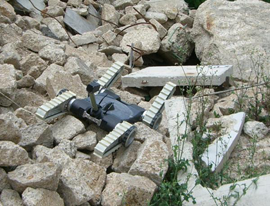- You are here:
- CCC Home
- |
- Activities
- |
- Funded Visioning Activities
- |
- Computing for Disaster Management
"Computing for Disasters" Report Released
June 25, 2012 -- The Computing Community Consortium today released a final report summarizing the key themes that emerged from the NSF/CCC Computing for Disaster Management Workshop. The report (download report) calls for a robust, multi-disciplinary community in which researchers partner with practitioners to tackle fundamental new research in socio-technical systems that enable decision making for extreme scales under extreme conditions. It describes what "Computing for Disasters" is, why it is different from existing research areas and paradigms, what its benefits to society and to science are, and what a broad investment portfolio and living roadmap facilitating the engagement of researchers from all disciplines might entail.
Find out more details about the workshop and report.
Computing for Disaster Management
Call for Participation:
Visioning Workshop on Computing for Disaster Management
Co-Chairs: Robin Murphy, Texas A&M, Trevor Darrell, UC Berkeley
April 24-25, 2012, Washington DC
Limited Participation, travel expenses covered by CCC
This one-and-a-half-day National Science Foundation (NSF)/Computing Community Consortium (CCC) co-sponsored visioning workshop on computing for disaster management will identify ways in which fundamental computing research in the broadest terms can advance the field of emergency response and recovery.
Disasters are often viewed as an application for computing and there are many instances where existing research streams can be leveraged to improve the enterprise. However, the unique attributes of disasters (extreme temporal and spatial scales, unpredictability, compromised wireless and physical information infrastructures, lack of access to the disaster sites, distributed sources of information and expertise, etc.) pose hidden computing challenges in real-time data sensing, visualization, analysis and prediction capabilities for on-the-fly decision-making, that can serve to not only advance emergency response and recovery but also drive forward the field of computer and information science and engineering broadly speaking.
The workshop will identify (1) fundamental research questions for individual computing disciplines and (2) cross-cutting research questions requiring novel, multi-disciplinary solutions. The workshop will include U.S. leaders in academia, the public sector, and industry. Results of this workshop will be presented to the NSF by June 20 in order to inform possible future initiatives.
The workshop will include presentations from invited thought-leaders and agency representatives, brainstorming, and case studies and focus group sessions with disaster professionals. Participants will meet and engage with scientists and practitioners outside their areas in order to share and identify multi-disciplinary opportunities.
Travel, meals, and lodging expenses for up to 35 approved participants will be reimbursed by the CCC. Attendees must commit to participation for the entire workshop. Due to space limitations, we can seat only 35 participants. We encourage interested experts from academia, government, industry, and the non-profit sector to submit a short proposal for participation via email including:
1) Name, affiliation, and contact info
2) 2-3 broad research ideas relevant to the workshop goals outlined above
Proposals must be under 2 pages in plain text or .rtf format. We especially encourage researchers still in the early stages of their careers to apply. In addition, we are seeking 4 graduate students to assist with the workshop; their travel and expenses will be funded as well. They should attach a letter of recommendation from their advisor in addition to the materials above.
Please email your proposal by Sunday March 25th to cdmworkshopchairs @ googlegroups.com. Selected applicants will be notified by Wednesday March 29th.
For inquiries, please contact Robin Murphy (murphy @ cse.tamu.edu) or Trevor Darrell (trevor @ eecs.berkeley.edu).


